
The Order of St. Andrew the Apostle the First-Called is the highest order conferred by both the Russian Imperial Family and by the Russian Federation . Established as the first and highest order of chivalry of the Russian Tsardom and the Russian Empire in 1698, it was removed from the honours system under the USSR before being re-established as the top Russian civil and military order in 1998.
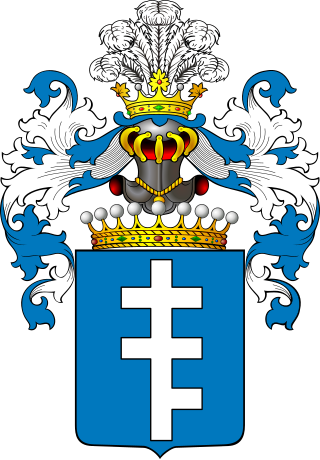
Count Alfred Wojciech Potocki hr. Piława (1785–1862) was a Polish nobleman (szlachcic), landowner, political and economic activist.

Count Stanisław Szczęsny Feliks Potocki, of the Piława coat of arms, known as Szczęsny Potocki was a member of the Polish szlachta and a military commander of the forces of the Polish–Lithuanian Commonwealth and then Poland. Knight of the Order of the White Eagle, awarded in August 1775.

The Polish Legions was a name of the Polish military force established in August 1914 in Galicia soon after World War I erupted between the opposing alliances of the Triple Entente on one side ; and the Central Powers on the other side, comprising the German Empire and Austria-Hungary. The Legions became "a founding myth for the creation of modern Poland" in spite of their considerably short existence; they were replaced by the Polish Auxiliary Corps formation on 20 September 1916, merged with Polish II Corps in Russia on 19 February 1918 for the Battle of Rarańcza against Austria-Hungary, and disbanded following the military defeat at the Battle of Kaniów in May 1918, against Imperial Germany. General Haller escaped to France to form the Polish army in the West against the anti-Polish German-Bolshevik treaty.

The House of Potocki was a prominent Polish noble family in the Kingdom of Poland and magnates of the Polish–Lithuanian Commonwealth. The Potocki family is one of the wealthiest and most powerful aristocratic families in Poland.
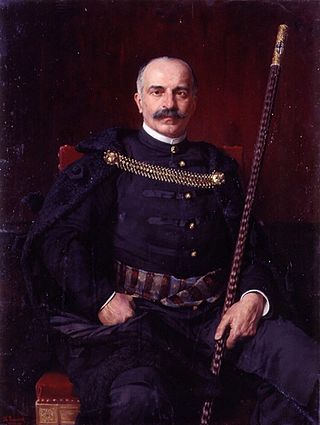
Prince Eustachy Stanisław Sanguszko was a Polish noble (szlachcic) and conservative politician.
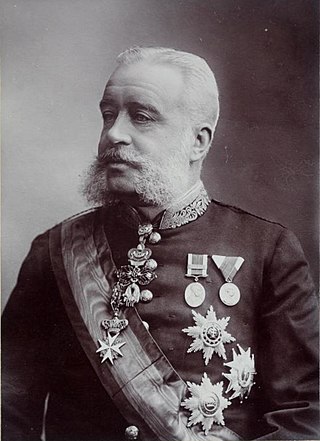
Count Agenor Maria Adam Gołuchowski was a Polish statesman who inherited much of his father's wealth. Between 1895 and 1906 he served as the Minister of Foreign Affairs of Austria-Hungary. He was responsible for a period of détente in Austrian relations with Imperial Russia, harmed due to the Austrian and Russian struggle for control of the Bosporus. From 1907 he headed the Polish Group in the Herrenhaus, the upper chamber of the Austrian parliament.
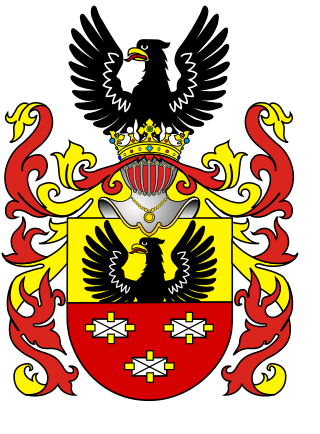
The House of Sułkowski is a Polish princely family and gentry who owned palaces in Rydzyna and Bielsko.
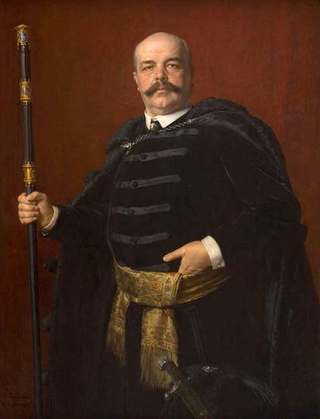
Stanisław h. Badeni (1850–1912) was a conservative Polish politician and a statesman of Austro-Hungarian Galicia. Born on 7 September 1850 in Surochów near Jarosław, in 1883 he was elected to the Galician Sejm. In 1895, he was chosen as the Land Marshal of Galicia and held that post until replaced by Andrzej Kazimierz Potocki in 1901. After the latter had been murdered in 1903, Badeni returned to the office and held it until his death in 1912. Among his greatest achievements was the successful recovery of the Wawel Castle from the Austrian authorities, which used it as military barracks. From 1891 until his death, he was also a member of the Austro-Hungarian Imperial Council.

The Order of Saint Stephen was an order of chivalry founded in 1764 by Maria Theresa. In 1938, Miklós Horthy took the rights and activities of Grand Master as Regent of Hungary. The name of the Order changed to the Royal Hungarian Order of Saint Stephen. The Order was terminated at the time of the proclamation of the Second Hungarian Republic in 1946. It was recreated in 2011 as the Hungarian Order of Saint Stephen, and to this day remains the highest order in Hungary.
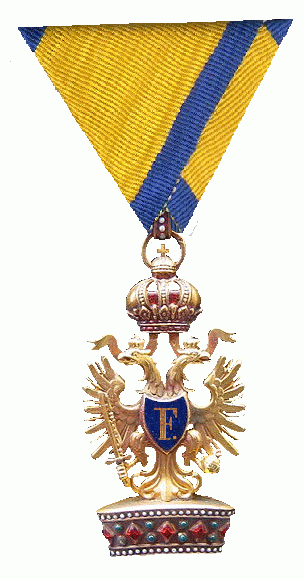
The Imperial Order of the Iron Crown was one of the highest orders of merit in the Austrian Empire and Austria-Hungary until 1918. It was founded in 1815 by Emperor Franz I of Austria as a re-establishment of the original Order of the Iron Crown, which previously had been an order of the Napoleonic Kingdom of Italy.
The Sejm of the Estates or Estates of Galicia were the parliament in the first half of the 19th century Galicia region in Austrian Empire. The body existed from 1775 to 1845. In the history of the Polish parliament, it succeeded the general sejm and local sejmiks on the territories of the Austrian partition. The Estates were disbanded following the Kraków Uprising of 1846. In 1861 they were succeeded by the Sejm of the Land.

The Diet of the Kingdom of Galicia and Lodomeria, and of the Grand Duchy of Cracow was the regional assembly of the Kingdom of Galicia and Lodomeria, a crown land of the Austrian Empire, and later Austria-Hungary. In the history of the Polish parliaments, it is considered the successor of the former sejm walny, or general sejm of the Kingdom of Poland and the Polish–Lithuanian Commonwealth, and also of the sejmik, or local councils, in the territories of the Austrian Partition. It existed from 1861 until the dissolution of Austria-Hungary in 1918.

Countess Ewa Józefina Julia Eudoksja Potocka hr. Piława was a Polish noble lady of the Potocki family.

The House of Badeni is the name of a Polish aristocratic family. The dynasty became important in the 19th century in partitioned Poland as one of the wealthiest and most influential families in Galicia.
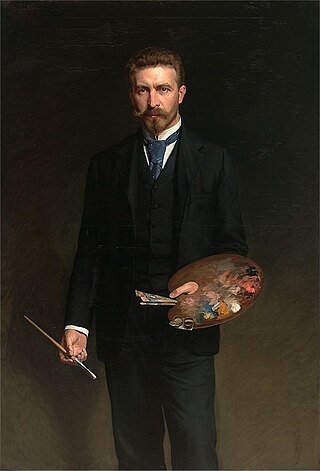
Kazimierz Teofil Pochwalski was a Polish painter known primarily for his portraits, although he produced works in a wide variety of genres.

The House of Lords was the upper house of the Imperial Council, the bicameral legislature of the Austrian Empire from 1861 and of the Cisleithanian (Austrian) half of Austria-Hungary upon the Compromise of 1867. Created by the February Patent issued by Emperor Franz Joseph I on 26 February 1861, it existed until the end of World War I and the dissolution of the Dual Monarchy, when on 12 November 1918 the transitional National Assembly of German-Austria declared it abolished. It was superseded by the Federal Council of the Austrian Parliament implemented by the 1920 Federal Constitutional Law.
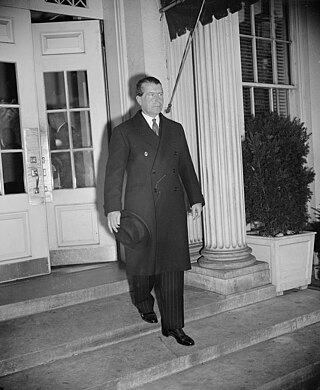
Count Jerzy Józef Henryk Potocki was a Polish nobleman, captain of the cavalry and diplomat.
 Russian Empire General Government of Galicia and Bukovina (September 1914 – 1915)
Russian Empire General Government of Galicia and Bukovina (September 1914 – 1915) Russian Empire General Government of Galicia and Bukovina (1916 – July 26, 1917)
Russian Empire General Government of Galicia and Bukovina (1916 – July 26, 1917)














